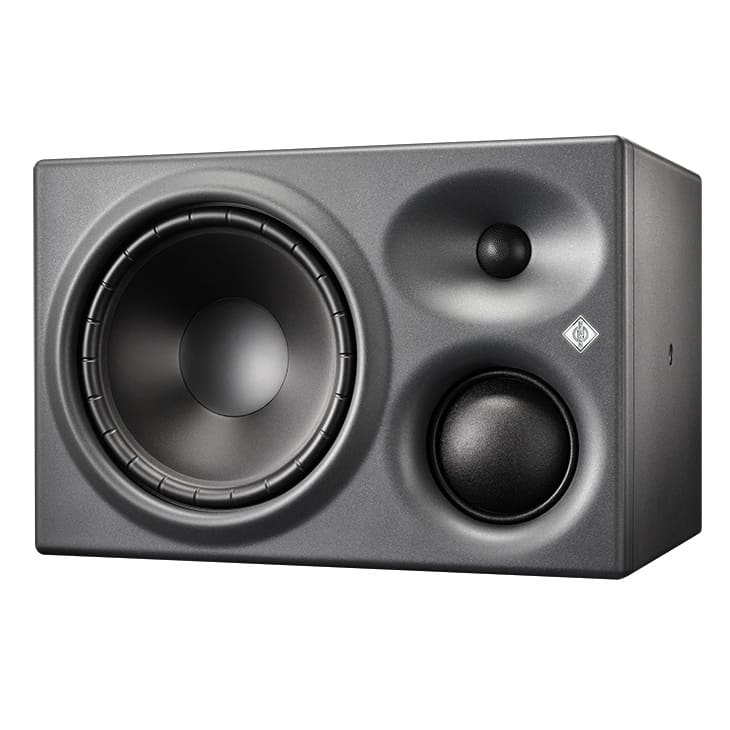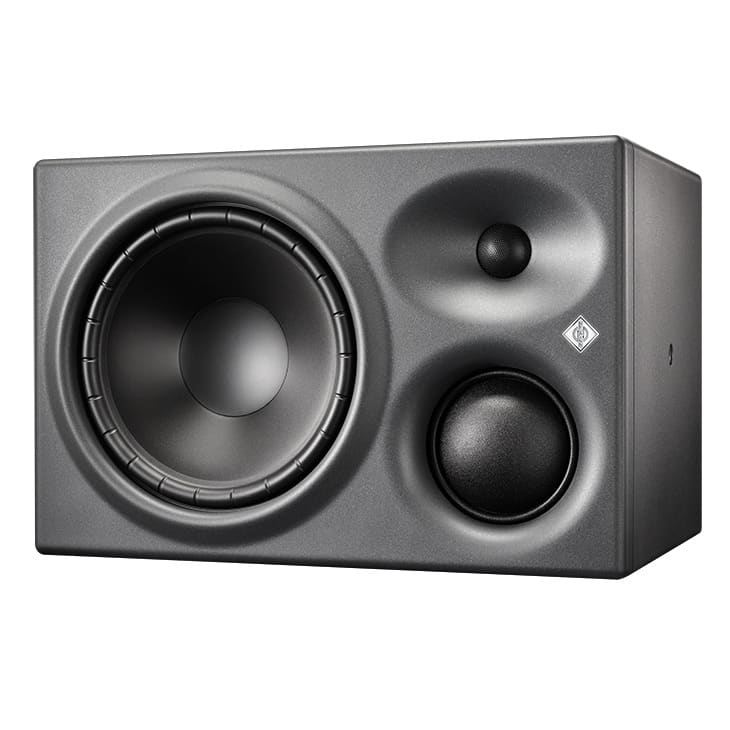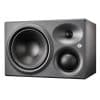The KH 310 is a three-way tri-amplified monitor with thermally protected Class AB amplifiers (210 W and two times 90 W). Its Mathematically Modeled Dispersion™ (MMD™) waveguide delivers sound waves into the room with superior accuracy. The drivers are modeled using Neumann’s in-house developed software, which reduces non-linear distortion in every situation. Sound distributed in a horizontally precise manner ensures flexibility in the listening position; the narrower vertical dispersion reduces the negative effects of nearby reflections – for example from a desk or mixing console. The precisely controlled dispersion characteristics optimize reproduction in different room configurations and the response is extremely adaptable through various acoustical control settings.
BEST WORKING ENVIRONMENT: CLOSE TO PROFESSIONAL EARS
The KH 310 is typically used in near-field applications such as project, music, broadcast and post-production studios for recording, mixing and mastering. It it also available as a digital input “D” version.
A SOLID BASS FOUNDATION, HIGH IMPULSE FIDELITY
With its powerful switched-mode power supply and tri-channel amplifiers, the KH 310 realizes sound pressure of up to 116.3 dB and thereby retains a high-resolution and neutral representation across the entire frequency response. This provides sufficient energy for even the most demanding impulse dynamics with no distortion or losses. The bass goes down to an impressive 34 Hz.
The closed cabinet design means a lower group delay. This results in almost the entire frequency range being reproduced at the same time; the transient response is precisely controlled at all times.
ULTRALIGHT FABRIC DOME OPTIMIZES MIDRANGE REPRODUCTION
The optimized design of the driver enables a pristine sound right down to the lowest bass regions. For most applications, the rich foundation offers enough bass extension to work cleanly on the mix without the necessity of a supplementary subwoofer. For demanding treble sounds, our own specially developed, powerful alloy fabric dome ensures distortion-free clarity in the high-frequency range.
The fabric midrange dome captures the middle frequency range with the utmost precision. Its ultralight material and the powerful neodymium magnet enable a significantly better transient response with considerably less distortion than comparable midrange domes.
DIGITAL INPUT AND DELAY
The KH 310 D enables flexible digital signal connectivity (24 bit, 192 kHz, AES3 and S/P-DIF) via a digital XLR or BNC input and buffered BNC output. Audio-visual synchronization ensures a lip sync delay of 0 to 10/12 frames. The loudspeaker can be delayed up to 400 ms, in order to compensate for varying listening distances.
THE PERFECT COMPLEMENT: THE KH 750 DSP SUBWOOFER
In addition to its outstanding acoustic properties this subwoofer offers functions for non DSP-based Neumann monitors connected (analog) to its outputs regarding the interplay with the following tools:
- Automatic Monitor Alignment – Automatic room correction of stereo systems using the Neumann MA 1 measurement microphone (software for Mac/PC)
- Neumann.Control – Free iPad®-App for setup, operation, and room correction of stereo systems via guided and/or manual alignment
HUNDREDS OF GOOD REASONS FROM THE NEUMANN PHILOSOPHY
The KH 310 has been developed true to the Neumann philosophy for monitor loudspeakers. Every component, every shape, every signal and every wave motion is a consequence of this philosophy. No form or component is there without reason. There are hundreds of tangible reasons built into the KH 310, which all stand for exceptionally pure and neutral sound. These include, for example, curvatures of the housing that reduce edge diffraction. Also included is the pistonic output of the bass driver which does not give rise to harmonic distortions, even with the highest sound peaks. Some of these reasons are obvious in the KH 310. Others Neumann prefers to keep to itself. But together, each can be heard – sound professionals in both large and small studios all around the world can testify to this. You can read more about the Neumann philosophy for studio monitors here.
*When using the analog inputs only.















